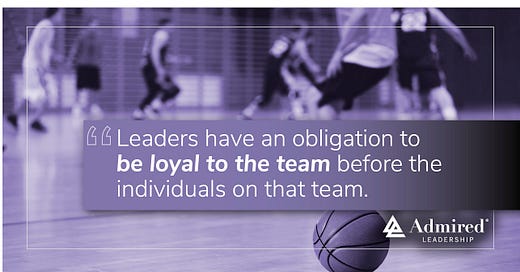Loyalty is a principal virtue in life. Being loyal in relationships demonstrates resolute support for those we care about. We all admire those who demonstrate this core quality.
Allegiance to others is a hallmark of great leaders and is often linked to their success. Among many benefits, loyalty creates stability in teams and fosters a positive climate of unequivocal support that flows up and down in a team. In good organizations, loyalty matters and leaders work hard to earn it.
Like many other qualities essential for great leadership, loyalty is reciprocal. Leaders receive loyalty when they give it. Smart leaders learn quickly that giving loyalty has a profound effect on the loyalty they receive. So, they practice being loyal as they look out for the best interests of team members when no one else will. Loyal leaders have your back, as they say. And this loyalty pays off. During tough times, loyalty shines brightly as leaders and followers show up for each other, offer unwavering support. Loyalty means looking past mistakes and errors for the sake of the relationship. Being loyal to those who are loyal to you is a great leadership quality—most of the time.
When the focus on loyalty becomes so strong that leaders trade in it, sacred lines can get crossed. Extreme loyalty goes from a leadership strength to a major flaw when leaders value it more than any other quality. One of the most common failings of powerful leaders is to be overly loyal to those who have been loyal to them. When leaders trade in loyalty, the compromises required for unconditional support between the parties often lead to situations where bad decisions are justified in the name of loyalty.
Loyalty taken too far blinds leaders to the realities everyone else sees clearly. As a result, leaders promote those who are less competent and stand by team members under legitimate assault for bad behavior. Overly loyal leaders ignore facts and stand by people when it is no longer in the best interest of the team. This is a fatal flaw and more common than we would like to admit.
The best leaders are loyal leaders, and at the same time understand the limits of allegiance to relationships. Those who have fought battles for you deserve your support and advocacy, but not at the expense of fairness and team effectiveness. Leaders have an obligation to be loyal to the team before the individuals on that team.
Ask yourself honestly: Is your loyalty to others a leadership strength or a weakness?





In the alternative - what are your boundaries? Having and maintaining healthy boundaries on what you will and will not accept in terms of conduct and performance makes determining the limits of your loyalty a lot easier to discern.
I love this article and have had the same conversation with a few leaders who are "loyal to a fault", as they say. However, I believe there is a significant difference between loyalty and fear of conflict. Loyalty is saying to somebody "You are not bringing the value I need, but I will continue to keep you around as long as you x, y and z." Fear of conflict is a leader who doesn't address a situation because they feel they owe something to the employee.
Either way, great piece. I'm going to push this out on my social channels shortly.